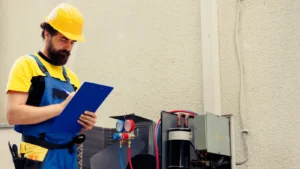
Want to see your potential revenue?
See what businesses like yours earn with Housecall Pro in 1 - 2 minutes.

HVAC technicians earn a median salary of $59,810 per year, or $28.75 per hour.* Your salary can vary depending on your location, experience level, certifications, and the type of work you specialize in. For example, technicians in major cities or states with higher living costs often earn more, as do those with advanced skills in things like refrigeration, controls, or energy-efficient systems.
If you’re thinking about becoming an HVAC technician or want to figure out earning potential as you grow your career, we’ve researched salaries and hourly rates based on various factors to give you an idea of what to expect. We’ve also provided expert tips to make yourself more marketable and land higher-paying jobs. In 2026, HVAC technician pay continues to reflect strong nationwide demand. The salary data below is based on the most recent figures by the U.S. Bureau of Labor Statistics.
*All data compiled from the U.S. Bureau of Labor Statistics.
Key takeaways:
Here’s a quick look at what impacts HVAC pay and where you can earn the most:
Average HVAC salary: Most HVAC techs earn between $39,130 and $91,020 per year, based on national BLS wage percentiles.
HVAC hourly rates: Typical pay falls between $25–$35 per hour, with her rates for experienced or specialized technicians.
Top-paying areas: Alaska, Massachusetts, and Washington, D.C. consistently rank among the highest-paying locations for HVAC technicians.
Major pay factors: Location, experience, and certifications have the biggest influence on earnings.
Highest-paying roles: Commercial HVAC, refrigeration, and controls technicians tend to earn more than residential-focused roles.
How much HVAC techs make: Annual and hourly rate by state (2026)
Where you live can make a big difference in how much you’re paid as an HVAC technician. States like Alaska, Minnesota, Massachusetts, Washington, D.C. pay well above the national average, while places like Mississippi and West Virginia fall on the lower end.
These differences often come down to cost of living, climate extremes, and local demand for skilled technicians. However, salaries typically land in the $55,000 to $62,000 range, giving you a good idea of what to expect nationwide.
The table below reflects the most recent BLS Occupational Employment and Wage Statistics (OEWS) data, published in May 2024 and commonly used as the federal baseline for current-year (2026) salary reporting.
| State | Hourly | Annual |
|---|---|---|
| Alabama | $23.70 | $49,290 |
| Alaska | $40.22 | $83,660 |
| Arizona | $27.20 | $56,580 |
| Arkansas | $22.71 | $47,240 |
| California | $31.39 | $65,290 |
| Colorado | $30.49 | $63,418 |
| Connecticut | $35.53 | $73,910 |
| Delaware | $28.82 | $59,940 |
| Florida | $24.32 | $50,580 |
| Georgia | $26.45 | $55,020 |
| Hawaii | $30.67 | $63,780 |
| Idaho | $25.35 | $52,730 |
| Illinois | $34.44 | $71,260 |
| Indiana | $28.99 | $60,310 |
| Iowa | $28.60 | $59,490 |
| Kansas | $27.29 | $56,750 |
| Kentucky | $28.31 | $58,880 |
| Louisiana | $25.73 | $53,510 |
| Maine | $29.87 | $62,130 |
| Maryland | $31.25 | $65,000 |
| Massachusetts | $37.02 | $76,990 |
| Michigan | $28.89 | $60,090 |
| Minnesota | $35.29 | $73,390 |
| Mississippi | $22.73 | $47,270 |
| Missouri | $29 | $60,330 |
| Montana | $28.17 | $58,600 |
| Nebraska | $28.70 | $59,690 |
| Nevada | $28.48 | $59,230 |
| New Hampshire | $30.97 | $64,410 |
| New Jersey | $33.56 | $69,800 |
| New Mexico | $26.45 | $55,020 |
| New York | $32.05 | $66,670 |
| North Carolina | $24.97 | $51,940 |
| North Dakota | $32.10 | $66,770 |
| Ohio | $29.08 | $60,490 |
| Oklahoma | $24.48 | $50,920 |
| Oregon | $30.16 | $62,740 |
| Pennsylvania | $29.38 | $61,120 |
| Rhode Island | $30.57 | $63,580 |
| South Carolina | $26.57 | $55,260 |
| South Dakota | $28.59 | $59,460 |
| Tennessee | $24.75 | $51,480 |
| Texas | $25.99 | $54,050 |
| Utah | $27.02 | $56,200 |
| Vermont | $28.93 | $60,170 |
| Virginia | $29.15 | $60,630 |
| Washington | $32.51 | $67,630 |
| Washington, D.C. | $40.09 | $83,390 |
| West Virginia | $22.13 | $46,040 |
| Wisconsin | $29.82 | $62,030 |
| Wyoming | $24.48 | $50,920 |
What states pay HVAC techs the most?
States with harsh climates, higher costs of living, strong union presence, or dense commercial infrastructure tend to offer the highest pay for HVAC technicians. These factors drive demand for skilled labor and push wages above the national median.
For example, Alaska consistently ranks as the highest-paying state due to extreme weather conditions, remote job sites, and a smaller labor pool. Washington, D.C. follows closely, supported by a high cost of living and steady demand from government, healthcare, and large commercial buildings.
Below is a closer look at the five highest-paying locations for HVAC technicians, based on the most recent BLS wage percentile data.
| Location | Low | Median | High |
|---|---|---|---|
| Alaska | $47,310 | $83,660 | $104,100 |
| District of Columbia | $49,400 | $83,390 | $105,480 |
| Massachusetts | $49,540 | $76,990 | $109,220 |
| Connecticut | $46,120 | $73,910 | $97,940 |
| Washington | $47,120 | $67,630 | $108,800 |
HVAC technicians can increase earnings by specializing in higher-value systems, earning additional certifications, taking on emergency or overtime work, or moving into lead and supervisory roles. Commercial HVAC, refrigeration, and controls work often pays more than residential service alone.
What states pay HVAC techs the least?
Even though warm climates still create steady demand for HVAC services, wages in these states typically don’t rise as high as they do in regions with higher living costs, denser urban development, or more complex commercial infrastructure.
States across parts of the South and Appalachia tend to report lower HVAC technician wages compared to the national median. This is largely driven by lower costs of living, fewer large commercial projects, lighter union presence, and a higher supply of available labor.
Below are the states with the lowest median HVAC technician pay, based on the most recent BLS wage percentile data.
| Location | Low | Median | High |
|---|---|---|---|
| West Virginia | $35,260 | $46,040 | $65,390 |
| Mississippi | $36,000 | $47,270 | $70,360 |
| Arkansas | $36,440 | $47,240 | $65,810 |
| Alabama | $35,940 | $49,290 | $69,350 |
| Oklahoma | $35,610 | $50,920 | $79,580 |
HVAC salary by experience level
Experience plays a major role in how much HVAC technicians earn. Most techs start at a lower hourly rate while they build hands-on skills, certifications, and confidence in the field. As experience grows, pay increases steadily—especially for technicians who take on diagnostics, system replacements, or leadership responsibilities. Senior technicians who work on complex systems or lead crews often earn well above the national median.
Here’s what HVAC pay typically looks like at different stages of a technician’s career, based on BLS wage percentiles and industry benchmarks:
| Experience Level | Annual Salary | Hourly Rate |
|---|---|---|
| Entry (0-2 years) | $39,130 | $18.81 |
| Intermediate (2-4 years) | $59,810 | $28.75 |
| Senior (4+ years) | $91,020 | $43.75 |
Other factors that affect HVAC technician salary
Several factors can influence how much you make as an HVAC technician beyond your location and experience:
- Industry sector: Commercial and industrial projects are often larger and more complex than residential ones, which can translate to higher pay.
- Company size and structure: Working for a larger company may offer more opportunities for overtime, structured raises, or benefits, while smaller companies might offer more flexibility or profit-sharing arrangements.
- Market demand: Local demand for HVAC services affects earning potential. Rates may be higher in peak seasons or in areas with a shortage of qualified technicians.
How to increase your HVAC salary
If you want to boost your earning potential, here are some practical steps you can take:
- Gain certifications: Completing certifications like NATE, EPA, or specialized system training can qualify you for higher-paying roles and make you more competitive in the job market.
- Advance to supervisory roles: Taking on responsibilities such as team lead or project supervisor can lead to substantial salary increases.
- Specialize in high-demand systems: Learning to work on refrigeration, commercial HVAC, or green/energy-efficient technology can open doors to more lucrative jobs.
- Think about location and employer type: Working in high-demand areas or for commercial/industrial companies can pay more.
- Build broad hands-on experience: Working across a variety of systems and projects makes you more versatile and valuable, which can lead to higher pay and better opportunities.
Highest-paying HVAC jobs
HVAC jobs aren’t just about maintaining heating and cooling systems. There are many different types of roles, depending on your interests and skills. Here are the 10 highest-paying HVAC jobs, according to Zip Recruiter:
- Thermal engineer ($80,000–$129,000): Maintains and analyzes heat transfer systems across industrial or aerospace applications.
- HVAC project manager ($80,000–$112,000): Oversees HVAC installations, designs projects, and supervises technicians.
- CFD engineer ($85,500–$110,000): Uses computational fluid dynamics to model heat and fluid flow in mechanical systems.
- HVAC sales representative ($59,500–$110,000): Generates leads, designs system proposals, and sells HVAC products.
- HVAC engineer ($58,500–$106,500): Designs HVAC and refrigeration systems and collaborates on installations.
- HVAC design engineer ($85,000–$100,000): Plans and installs HVAC systems, considering efficiency and client needs.
- HVAC estimator ($59,500–$94,500): Calculates project costs, materials, and labor for HVAC projects.
- HVAC residential service technician ($53,000–$90,000): Installs, maintains, and repairs residential HVAC systems.
- HVAC manager ($58,000–$87,500): Oversees teams and ensures smooth operation of HVAC services.
- HVAC controls technician ($60,500–$80,000): Installs and programs the control systems for HVAC equipment.
Starting your own HVAC business
Starting your own HVAC business gives you control over your rates and the jobs you take. While it comes with more responsibility, it can also significantly increase your income compared to working for someone else.
This is where Housecall Pro can help. With our all-in-one HVAC software, you can:
- Streamline scheduling and dispatch to save time and handle more jobs efficiently.
- Simplify invoicing and payment collection, so you get paid faster and reduce administrative headaches.
- Track your business performance with real-time dashboards, helping you make smarter decisions about pricing, services, and staffing.
- Manage customer relationships to encourage repeat business and referrals.
Using tools like Housecall Pro allow you to focus more on growing your business and less on paperwork, helping you maximize your earnings as both a technician and business owner. Interested in learning more? Try our free 14-day-trial.
Get In Touch: 858-842-5746
Let us earn your trust
See plan options and feature breakdown on our pricing page.
HVAC technician salaries FAQ
-
Is HVAC a good career in the United States?
-
Working in HVAC is absolutely a good career in the United States. It offers solid pay, consistent job stability, and high demand. According to the Bureau of Labor Statistics, jobs for HVAC technicians are expected to increase by 6% through 2032—more so than for any other occupation.
-
Do HVAC technicians make good money?
-
HVAC technicians can make good money. Though the average salary is $59,810 per year, you can make as much as $90,000 or $100,000 depending on your location, experience level, expertise, and certifications.
-
Can you make six figures as an HVAC tech?
-
It’s possible to make six figures as an HVAC tech, but it will take years of experience and potentially special training or certifications. Experienced techs who specialize in high-demand systems, take on supervisory roles, or work in top-paying states like Alaska, D.C., or Massachusetts often earn $100,000 or more annually.
-
Do you need to be licensed to become an HVAC tech?
-
Yes, most states require HVAC techs to be licensed, but the requirements vary.
-
What state pays HVAC techs the most?
-
Alaska pays HVAC techs more than any other state. The average is $40.22 per hour or $83,660 per year.







